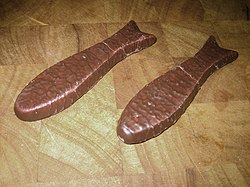 Two chocolate fish | |
| Type | Confectionery |
|---|---|
| Place of origin | New Zealand |
| Main ingredients | Pink or white marshmallow, milk chocolate |
A chocolate fish or choccy fish is a traditional confectionery item in New Zealand. In New Zealand culture, it is a common reward for a job done well ("Give that kid a chocolate fish"). [1] [2] [3] [4] [5]
Chocolate fish have a conventional fish-shape and a length of 5 to 8 centimetres (2.0 to 3.1 in). They are made of pink or white marshmallow covered in a thin layer of milk chocolate. The ripples or "scales" on the fish are created simply by the fish moving under a blower; this slides the unset chocolate back, creating the illusion of scales on the fish.
Several manufacturers make the fish; the most well-recognised is Cadbury. [6] Smaller, or "fun-sized" variants of the chocolate fish are colloquially referred to as "sprats". Variants of the traditional item exist; a common version is made of solid orange-flavoured milk chocolate.